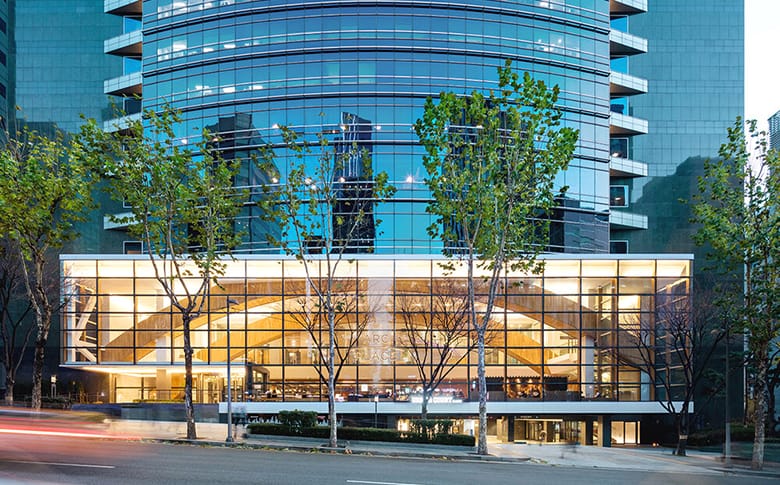
Blackstone’s sale of Arc Place in Seoul was Q1’s biggest office deal globally (Image: 8 Partnership)
Acquisitions of income-generating real estate in Asia Pacific dipped 13 percent in the first quarter compared with the same period a year ago, falling to $31.3 billion despite big-ticket office deals buoying regional standouts South Korea and Japan, according to MSCI Real Assets.
Deals in South Korea surged 81 percent from last year’s low base to $4.8 billion in the first three months of the year, the data provider said in its latest Capital Trends report. Asia’s fourth-largest economy was home to APAC’s top single-asset property transaction and the biggest office deal worldwide during the period: Blackstone’s $593.1 million sale of Arc Place in Seoul to local fund manager Koramco.
Japan investment eased 15 percent year-on-year to $9.1 billion, but was still strong enough to top the regional leaderboard as deals in China slid 19 percent to $8.3 billion. Activity in some key markets is stabilising, said Benjamin Chow, head of real assets research for Asia at MSCI.
“Initial signs in 2024 so far point to investors continuing to focus on growth areas like data centres and emerging living sectors,” Chow said Monday in a release.
Seoul Offices Defy Odds
Amid global gloom regarding the future of the office, MSCI’s data showed Seoul standing out as one of the few markets where major office deals continue to be struck despite elevated financing costs.

Benjamin Chow, head of real assets research for Asia at MSCI
Although Arc Place in Gangnam district was the priciest Seoul office asset at $878 per square foot, the 4.3 percent capitalisation rate for the deal was also one of the highest seen in the past three years, according to the report.
The South Korean capital also delivered the region’s second-largest trade of the quarter, as a pension fund, the Korea Scientists and Engineers Mutual-Aid Association, scooped up an office development in Jung district with a $494.3 million forward purchase.
Tokyo maintained its top position among APAC metro areas with more than $5 billion transacted in the first quarter, MSCI said. Major deals included two office disposals: Gaw Capital’s $592 million sale of the Aoyama Building to Taisei Corporation (as part of a three-asset portfolio transaction) and Sekisui House REIT’s offloading of Garden City Gotenyama in Shinagawa ward to an undisclosed buyer for $405.6 million.
Deal volume in Singapore plunged 56 percent year-on-year to $1.8 billion, which still ranked the Southeast Asian hub in fifth place regionally behind Australia’s $2.8 billion, as the retail segment dominated and office deals remained subdued in the city-state.
Robert Kwok’s Allgreen Properties rang up the fifth-biggest APAC deal during the period with its $408.7 purchase of Seletar Mall in Singapore’s Fernvale area from a joint venture of Cuscaden Peak and United Engineers Ltd.
Bumpy Trough
MSCI detected several indications that the region’s real estate investment slide is nearing a bottom.
The data provider observed that the deal pipeline — the stock of outstanding deals where a contract has been signed but has yet to be completed — has remained relatively stable over the past few quarters, while yield expansion is tapering off for institutionally favoured sectors like Korean offices and Australia’s industrial and office markets..
Even so, most markets outside of Japan and China are characterised by thin or negative yield spreads, meaning deals that could have generated sizable returns before 2022 would no longer be attractive at current debt costs, according to MSCI.
“A lot still rides on the timing and magnitude of US-led interest rate cuts, and in recent weeks the question has become whether these will even happen,” the report said. “It is clear though, that this trough is likely to be a bumpy one.”
Leave a Reply